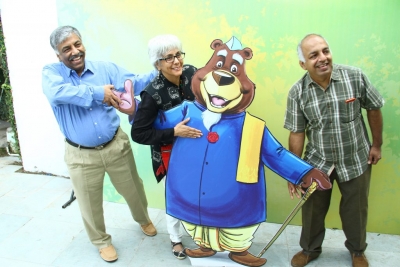
Recognition
At the Karadi Tales and Karadi Path offices in Chennai, the mood is ebullient ever since news came in that both – the publishing house and the education firm – have been shortlisted for three London Book Fair International Excellence Awards this year. The award, new in their sixth edition, is held by the London Book Fair in partnership with the UK Publishers Association. There is enough and more reason to celebrate. As many as 29 countries are represented in this year’s shortlist, and all three shortlists from India are from the Karadi Company. Karadi Tales has been shortlisted for Audio book Publisher of the Year, the other nominee being Penguin Random House, the U.S. Karadi Path has been shortlisted in two categories: the Education Initiative Award and the Educational Learning Resources Award. This is the second consecutive year Karadi Tales has been shortlisted for Audio book Publisher of the Year while Karadi Path is the only organisation shortlisted for awards in two categories.
Shobha Viswanath, co-founder and publishing director, Karadi Tales, says, “It goes saying we are delighted. We were very strong contenders, but to be shortlisted in three categories is very special.” For a company that started in 1996, the 24 years have been a roller-coaster ride. Karadi Path, the education arm of Karadi Tales, for instance, was envisaged in the year 2000 and research and development began almost immediately. The company formally came into force only a decade later. “It’s actually validation for a lot of things,” says C.P. Viswanath, co-founder of Karadi Path, adding, “That’s about two decades of work speaking.”
Filling a void
Shobha and Viswanath, along with the latter’s Brother Narayan Parsuram, founded Karadi Tales to fill the obvious lacuna in the children’s audio books space. “We were in Detroit (the U.S) when I used to take my son Kaushik to the nearest community library and get back audio books for him. He started reading by about two years. But when we came to India, we sadly saw no quality audio books available,” she says. Their son was five by then and the entrepreneurial bug had bitten them. “We thought of a music publishing house given that the entire family was so passionate about music. But the idea that finally took shape was of a publishing house for children’s books with a strong focus on audio books.” They got voices such as Naseeruddin Shah, Ratna Pathak, Tom Alter, Gulzar, Girish Karnad and more to join them, and soon Karadi’s became the most sought-after books and audio books around the country. The company was named Karadi Tales only in 2000 after the narrator became very popular; earlier it was named Sky music India.
Focus on learning
That very year, they also started exploring avenues to revolutionize English language learning. “We responded to a Dharavi-based NGO’s feedback and that helped us take the initial steps towards Karadi Path. They were using a lot of Karadi books to teach the English language and we realised the children were responding to the non-verbal drama in the story. When we went there to see how we could teach them English, we realised they already knew three or four languages. Nobody sat down and taught them these languages. Likewise, English can’t be really taught.” Karadi Path took the route of prediction and discovery to facilitate language and learning. “We realised that just like Artificial Intelligence, language learning depends heavily on these two principles.” The learning programme is running successfully in 3,500 schools across the south and the west of India.
While they are waiting eagerly for March 10 for the awards to be announced, there is a bigger party planned for the next year when they celebrate their silver jubilee. Plans are underway for newer products and delivery innovations for audio books. An app is being tested for launch next year. “It is good to go!” says Shobha viswanath.
The challenges
Asked about the challenges faced by independent children’s publishing houses in India, she says it is the lack of support. “Take parents’ awareness, government support, library support, price points, marketing, distribution… independent publishing houses are being hit everywhere. But the heartening thing is how established publishers are starting off children’s imprints. We need that right now.”
Picture Credit : Google

